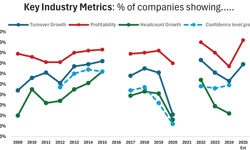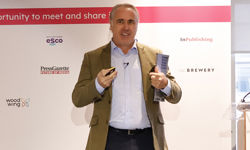
BBC Good Food’s recipe for success sounds simple. Have a clear purpose. Know your USP. Be responsive, and ready to change. Assembling it in a way that makes for a great publishing brand, however, is anything but. In fact, it takes a particular approach combined with a certain skillset, both of which resulted in BBC Good Food being named PPA Media Brand of the Year (Consumer Media) in 2021 and 2022.
“It’s about really knowing what you’re here for and sets you apart,” says Alex White, who as managing director, food and parenting at Immediate Media Company, oversees the title across print and digital.
“It’s about striving to be the absolute best at doing that and being prepared to keep evolving and innovating to keep meeting your audience’s changing needs – be that in terms of consumer trends and relevant platforms, or content focus.
“It’s about not treading water. And it’s about setting the trends as well as following them.”
BBC Good Food is here to help everyone eat good food every day. As such, its audience is very broad. Even so, its mission is to help people make the most out of every meal-time – be that people on a special diet, with certain health goals in mind, or simply working to a budget.
In a cost-of-living crisis, working to a budget is a growing priority for everyone, of course. Which is where Immediate’s commitment to understanding its audiences intimately comes into its own.

“For us, data is critical to creating a brand and maintaining its position. And we are fortunate to sit on an absolute wealth of user data – BBCGoodFood.com regularly attracts 25 million users a month, so that’s an awful lot of user data we have potential access too,” she continues.
“We use analytics and behaviour data to really try and understand that audience and respond to what they are looking for, segment it, and tailor our content and marketing strategy – and our commercial model – around knowing that audience really well.”
As a result, BBC Good Food made it its mission during the worst of the pandemic crisis to help the nation eat safely and in ways that strengthen immune systems and aid Covid-19 recovery.
Now, in response to the cost-of-living crisis, it’s new campaign – Cook Smart – is bringing together recipes, resources, and ideas to help the nation eat well on a budget and to get people to help each other as well as help themselves.
Out of the frying pan…
“We’ve moved straight from one global crisis to the next – families are facing huge challenges with how to feed themselves on a budget. We see this as a challenge equivalent to lockdown and are turning our attention to how to change what we are doing to stay relevant,” White explains.
“Cook Smart, running across print and digital, includes a long-term content plan to offer practical advice and meal plans to everyone affected by rising costs. And we see it as a two-way conversation with our audience and will ask them for tips and advice to share, too.”
Editorial brilliance comes from the combined impact of data insight, instinct, and editorial expertise, White believes.
“We have an audience development team that works across all our brands, and we work hand-in-hand with them to understand search trends – what people are looking for – so we can answer every query. We look day in, day out at our ranking against key search terms – what gaps we need to fill,” she says.
“And we work with our cookery team to identify the best recipes that we need to create in order to generate the content we need.”
To achieve long-term brand success, White adds, it is important to avoid a number of common pitfalls.
Forgetting why you exist in the minds of consumers is one. “If you spread yourself too thin and try to be all things to all people, it can be harmful to your brand,” she says. Instead, you have to focus on what delivers most value to your audiences.
Other watch outs include avoiding the temptation to compromise on brand values to win business commercially and not focusing enough on what your customers are trying to achieve – be that your audience or your commercial partners.
Transparency with everyone you work with, White adds, is also essential.
“Turning some commercial deals away, as much as it breaks my heart, is sometimes necessary. And part of the privilege and responsibility of working with the BBC, as part of our brand licence with them, is we work closely with our colleagues there and closely adhere to their brand values and commercial guidelines,” she notes.
But also important is having the best editorial talent that will, given the parameters within which they work – from brand guidelines to commercial partners’ and audiences’ want and needs, deliver top-quality and compelling content.
“Our editor-in-chief, Christine Hayes, and her team work really closely with me in terms of defining brand values, what we stand for and don’t stand for, and how both translate into content,” White reveals. “Whenever working in partnership with people, it’s important to bear in mind the win-win.”

You can hear Alex White being interviewed by James Evelegh on a recent episode of The InPublishing Podcast, which was sponsored by Air Business, a leading supplier of distribution and subscription management services.
This article was first published in InPublishing magazine. If you would like to be added to the free mailing list, please register here.












